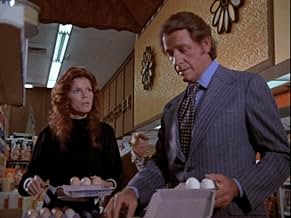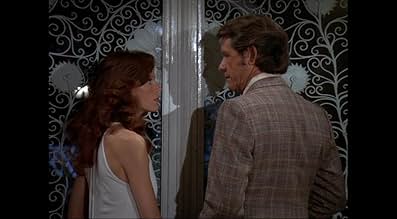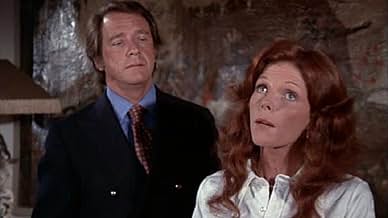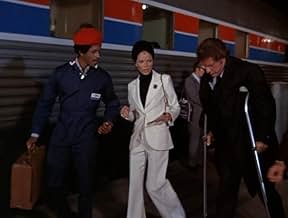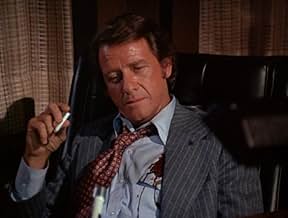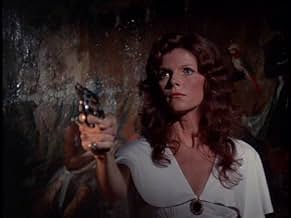IMDb RATING
4.6/10
641
YOUR RATING
A scheming wife lures an insurance investigator into helping murder her husband and then declare it an accident. The investigator's boss, not knowing his man is involved in it, suspects murd... Read allA scheming wife lures an insurance investigator into helping murder her husband and then declare it an accident. The investigator's boss, not knowing his man is involved in it, suspects murder and sets out to prove it.A scheming wife lures an insurance investigator into helping murder her husband and then declare it an accident. The investigator's boss, not knowing his man is involved in it, suspects murder and sets out to prove it.
Arnold F. Turner
- Redcap
- (as Arnold Turner)
Rand Brooks
- Conductor
- (uncredited)
Tom Curtis
- Charlie
- (uncredited)
John Furlong
- George
- (uncredited)
Featured reviews
Watch the Original with the same title from 1944! This made for TV movie, is just god-awful! Although it does use (as far as I can tell) almost the same dialog, it just doesn't work! Is it the acting, the poor directing? OK so it's made for TV, but why watch a bad copy, when you can get your hands on the superb original? Especially as you'll be spoiled to the plot and won't enjoy the original as much, as if you've watched it first!
There are a few things that are different from the original (it's shorter for once), but all are for the worse! The actors playing the parts here, just don't fit the bill! You just don't believe them and who could top Edward G. Robinsons performance from the original? If you want, only watch it after you've seen the original and even then you'll be very brave, if you watch it through! It's almost sacrilege!
There are a few things that are different from the original (it's shorter for once), but all are for the worse! The actors playing the parts here, just don't fit the bill! You just don't believe them and who could top Edward G. Robinsons performance from the original? If you want, only watch it after you've seen the original and even then you'll be very brave, if you watch it through! It's almost sacrilege!
It was hard to watch this film and be totally fair and objective since I am a big fan the original 1944 movie. That, to me and many others, is one of the greatest film noirs ever made. Realizing this is simply a shortened made-for-TV film and that most people had trashed it, I didn't expect much, but you can't help but compare this with the '44 film. Scene after scene, I found myself comparing what I was looking at it, and remembering how it played out with Fred MacMurray, Barbara Stanwyck, Edward G. Robinson and others. Now I was seeing these famous actors playing their famous roles replaced by Richard Crenna, Samantha Eggar and Lee J. Cobb.
When it was all over, I found it wasn't as bad as I had expected but it's no match for the 1944 original. The two main areas in which this made-for-TV film wasn't as good were (1) the electricity between the two leads was missing and (2) being only 90 minutes, they rushed the story with hardly time to develop the plot, characters and chemistry between those leads. Crenna and Eggar were flat, and simply no match for MacMurray and Stanwyck as "Walter Neff" and "Phyllis Dietrichson," respectively.
Where this re-make held its own was in the other characters, such as "Barton Keyes" and "Edward Norton." Cobb was terrific as Keyes and Robert Webber as Norton, head of the insurance company. It also was somewhat interesting to see the time frame changed, so the houses, cars, telephones, dictating machines, etc., were all early '70s instead of mid '40s. Otherwise, the storyline was very similar, just rushed.
However, one viewing was enough and I will happily go back to the original version for the rest of my viewings of this classic story and film.
When it was all over, I found it wasn't as bad as I had expected but it's no match for the 1944 original. The two main areas in which this made-for-TV film wasn't as good were (1) the electricity between the two leads was missing and (2) being only 90 minutes, they rushed the story with hardly time to develop the plot, characters and chemistry between those leads. Crenna and Eggar were flat, and simply no match for MacMurray and Stanwyck as "Walter Neff" and "Phyllis Dietrichson," respectively.
Where this re-make held its own was in the other characters, such as "Barton Keyes" and "Edward Norton." Cobb was terrific as Keyes and Robert Webber as Norton, head of the insurance company. It also was somewhat interesting to see the time frame changed, so the houses, cars, telephones, dictating machines, etc., were all early '70s instead of mid '40s. Otherwise, the storyline was very similar, just rushed.
However, one viewing was enough and I will happily go back to the original version for the rest of my viewings of this classic story and film.
This 1973 TV remake of the Billy Wilder classic is inferior to the original. Surprise!
First, the good things. Lee J. Cobb makes a terrific Barton Keyes. He's not as good as Edward G. Robinson, of course, but he's the only reason to watch this. This remake's only improvement over the original is that it cuts down the role of Lola Dietrichson, the step-daughter of the femme fatale, Phyllis Dietrichson.
And that's it for the good things.
The bad things are many. The director records everything in an indifferent manner: if you watched the film with the sound muted you'd hardly get the impression that anything especially interesting was happening. Because of modern bad taste, the film must be in color instead of black and white. Because of 1970s bad taste, all the sets are distractingly ugly. Walter Neff's expensive apartment, in particular, is hideous.
The modern setting hurts in a lot of small ways. Train trips were a bit more unusual in the 70s than in the 40s, so Mr. Dietrichson's decision to take a train seems more of a contrivance. Men stopped wearing hats, which prevents Walter from covering up his brown hair while posing as the white-haired Mr. Dietrichson. Women in mourning stopped wearing veils, which robs Samantha Eggar of a prop Barbara Stanwyck made splendid use of in a key scene. (Oddly, Lola still has the line where she reveals that her stepmother was trying on a black hat and veil before she had need of them.)
Stephen Bochco keeps much of the Billy Wilder-Raymond Chandler script the same. But he makes a lot of tiny, inexplicable changes to the dialogue which leave the script slightly flabby where once it was lean and muscular. Outrageously, the famous motorcycle-cop banter is gone, but look closely and you'll see what looks like a post-production cut where those lines should have been. Bochco may not be to blame.
Richard Crenna is passable as Walter Neff. What might have made this version tolerable is a really splendid Phyllis Dietrichson. Instead we get Samantha Eggar, who comes off like a standard-issue villainess from "Barnaby Jones." But who can blame Eggar? With a director who barely seems interested in what's happening in front of the camera, how could Barbara Stanwyck herself have come off well?
First, the good things. Lee J. Cobb makes a terrific Barton Keyes. He's not as good as Edward G. Robinson, of course, but he's the only reason to watch this. This remake's only improvement over the original is that it cuts down the role of Lola Dietrichson, the step-daughter of the femme fatale, Phyllis Dietrichson.
And that's it for the good things.
The bad things are many. The director records everything in an indifferent manner: if you watched the film with the sound muted you'd hardly get the impression that anything especially interesting was happening. Because of modern bad taste, the film must be in color instead of black and white. Because of 1970s bad taste, all the sets are distractingly ugly. Walter Neff's expensive apartment, in particular, is hideous.
The modern setting hurts in a lot of small ways. Train trips were a bit more unusual in the 70s than in the 40s, so Mr. Dietrichson's decision to take a train seems more of a contrivance. Men stopped wearing hats, which prevents Walter from covering up his brown hair while posing as the white-haired Mr. Dietrichson. Women in mourning stopped wearing veils, which robs Samantha Eggar of a prop Barbara Stanwyck made splendid use of in a key scene. (Oddly, Lola still has the line where she reveals that her stepmother was trying on a black hat and veil before she had need of them.)
Stephen Bochco keeps much of the Billy Wilder-Raymond Chandler script the same. But he makes a lot of tiny, inexplicable changes to the dialogue which leave the script slightly flabby where once it was lean and muscular. Outrageously, the famous motorcycle-cop banter is gone, but look closely and you'll see what looks like a post-production cut where those lines should have been. Bochco may not be to blame.
Richard Crenna is passable as Walter Neff. What might have made this version tolerable is a really splendid Phyllis Dietrichson. Instead we get Samantha Eggar, who comes off like a standard-issue villainess from "Barnaby Jones." But who can blame Eggar? With a director who barely seems interested in what's happening in front of the camera, how could Barbara Stanwyck herself have come off well?
When Samantha Eggar (as Phyllis Dietrickson) answers the door of her house swathed in a towel, you realize that as competent an actress as Eggar may be, she doesn't have the hypnotic allure of Barbara Stanwyck. And it is not entirely Eggar's fault. In the original film, Wilder had Stanwyck not only appear in a towel, but she enters the scene on the second floor balcony of the house. And she doesn't "come out"; she appears, almost as if by magic. Walter Neff is staring up at her from below on the first floor. There is a reason for this. Stanwyck is much higher than Neff (Fred MacMurray) when they are first introduced. It is not just the towel. The towel adds to the seductive allure. Her pose is like a Greek Goddess overlooking her domain, and, in a strange way, you feel as if, from the start, she is actually controlling the entire situation. She has sexual, even magic, power. This person is no ordinary housewife. This person is a mystery with secrets hidden within.
Back to 1973. The remake has Crenna knock on the front door. Stanwyck's stand-in, Eggar, answers the door with a towel around her. There is no "appearance". She simply opens the door. The alluring superiority that grabs the audience at the first appearance of Stanwyck in 1944 is entirely absent in 1973. She opens the door with a towel around her. It may be sexy in a Charlie's Angels sort of way, but it's not nearly as mysterious. The filmmakers of the remake seem to misunderstand Wilder's point. The script may have said "Phyllis appears in towel" so the filmmakers of the remake simply follow the instructions and include the required towel. The point is not the towel. The point is the enigmatic quality of Phyllis, and the potential power she wields. Wilder gave her a towel to add to her mystique. The filmmakers of the remake gave her a towel because that's what Wilder did. And in the choice of shot, lost all of Phyllis' mystique.
Richard Crenna also seems miscast. He seems like he's "acting" and not really in the midst of the dilemma. Part of the problem is Crenna appears so much like a 70's actor. He can't get into the 1940's. When MacMurray first speaks into the microphone, sweat begins to drip from his face. No sweat on Crenna. And they also changed one of the crucial lines at the beginning. In the original, Neff says, "I didn't get the money, and I didn't get the woman." In the 1973 version, Crenna says, "I didn't get the money, and I didn't want the woman." Did the filmmakers completely misunderstand the entire point of the story? Or were they dumbing it down for a "television" audience?
This made-for-TV movie is a by-the-numbers rendition. All the sharp edge of the original is lost. The only stand-out, maybe, is Lee J. Cobb in the role made famous by Edward G. Robinson. But he cannot save the loss of intensity of the original. This 1973 boring remake is a forgettable TV-movie made probably by the same people who did "Gilligan's Island". They might as well have tried to remake "Citizen Kane" or "Gone with the Wind". If mediocrity is the best one can hope for, what's the point? The 1944 classic is a Film with a capital "F". This made-for-TV remake deserves an "F" grade, or, maybe a "D" for dumb.
Back to 1973. The remake has Crenna knock on the front door. Stanwyck's stand-in, Eggar, answers the door with a towel around her. There is no "appearance". She simply opens the door. The alluring superiority that grabs the audience at the first appearance of Stanwyck in 1944 is entirely absent in 1973. She opens the door with a towel around her. It may be sexy in a Charlie's Angels sort of way, but it's not nearly as mysterious. The filmmakers of the remake seem to misunderstand Wilder's point. The script may have said "Phyllis appears in towel" so the filmmakers of the remake simply follow the instructions and include the required towel. The point is not the towel. The point is the enigmatic quality of Phyllis, and the potential power she wields. Wilder gave her a towel to add to her mystique. The filmmakers of the remake gave her a towel because that's what Wilder did. And in the choice of shot, lost all of Phyllis' mystique.
Richard Crenna also seems miscast. He seems like he's "acting" and not really in the midst of the dilemma. Part of the problem is Crenna appears so much like a 70's actor. He can't get into the 1940's. When MacMurray first speaks into the microphone, sweat begins to drip from his face. No sweat on Crenna. And they also changed one of the crucial lines at the beginning. In the original, Neff says, "I didn't get the money, and I didn't get the woman." In the 1973 version, Crenna says, "I didn't get the money, and I didn't want the woman." Did the filmmakers completely misunderstand the entire point of the story? Or were they dumbing it down for a "television" audience?
This made-for-TV movie is a by-the-numbers rendition. All the sharp edge of the original is lost. The only stand-out, maybe, is Lee J. Cobb in the role made famous by Edward G. Robinson. But he cannot save the loss of intensity of the original. This 1973 boring remake is a forgettable TV-movie made probably by the same people who did "Gilligan's Island". They might as well have tried to remake "Citizen Kane" or "Gone with the Wind". If mediocrity is the best one can hope for, what's the point? The 1944 classic is a Film with a capital "F". This made-for-TV remake deserves an "F" grade, or, maybe a "D" for dumb.
This remake of the film noir classic about a seductress and an insurance man having an affair of horror, planning the murder of her husband, gives us the same question as just about any remake.
Why the remake? Many remakes are simply film adaptations of classic novels, such as TREASURE ISLAND.
Here, though, we have what is essentially a "homage" to E.G. Robinson and the others, who made the original classic.
The crux of the story is the Columbo style E.G. character. He is always the important one. And Lee J Cobb does a fine job. In fact, he is the the entire show in this one. I don't mean to disparage Richard and Samantha, but they were very bland.
And that was probably the point, to keep them bland.
It still makes for the question "Why the remake?" Lee J Cobb tries to make this his own role. And that's okay. You really don't want to try to mimic a classic. He does okay, but there are times when E.G. just did it perfect. For example, when he says "Closer than that", E.G. was perfect. Cobb, in the effort to make it his own, knows it is taking something away when he adds "much closer", but he doesn't want to be compared too much to E.G.'s perfect portrayal.
Which is why you don't really want to remake a classic film noir.
Why the remake? Many remakes are simply film adaptations of classic novels, such as TREASURE ISLAND.
Here, though, we have what is essentially a "homage" to E.G. Robinson and the others, who made the original classic.
The crux of the story is the Columbo style E.G. character. He is always the important one. And Lee J Cobb does a fine job. In fact, he is the the entire show in this one. I don't mean to disparage Richard and Samantha, but they were very bland.
And that was probably the point, to keep them bland.
It still makes for the question "Why the remake?" Lee J Cobb tries to make this his own role. And that's okay. You really don't want to try to mimic a classic. He does okay, but there are times when E.G. just did it perfect. For example, when he says "Closer than that", E.G. was perfect. Cobb, in the effort to make it his own, knows it is taking something away when he adds "much closer", but he doesn't want to be compared too much to E.G.'s perfect portrayal.
Which is why you don't really want to remake a classic film noir.
Did you know
- TriviaBilly Wilder (the co-writer and director of the original version, Assurance sur la mort (1944)) and Barbara Stanwyck (who played Phyllis in the original version) both saw the film in their respective homes when it broadcast. When it was over, Wilder immediately phoned Stanwyck, said, "Missy, they just didn't get it right," and hung up.
- ConnectionsVersion of Assurance sur la mort (1944)
Details
- Release date
- Country of origin
- Language
- Also known as
- Double Indemnity
- Filming locations
- Production companies
- See more company credits at IMDbPro
- Runtime
- 1h 14m(74 min)
- Sound mix
- Aspect ratio
- 1.33 : 1
Contribute to this page
Suggest an edit or add missing content

